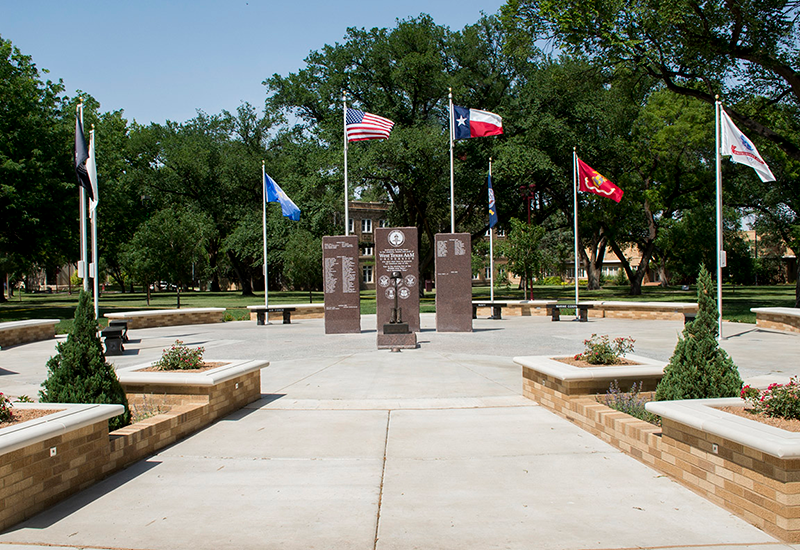
West Texas A&M University walks with veterans to create a better University and a better Panhandle. While serving all students is in our heart and soul, there is a special place for veterans. They have put their lives on the line to protect and defend our nation. They bring a commitment to many values that make WT distinctive.
According to a study published by Syracuse University, veterans make excellent students—a result with which we tend to agree. Graduation rates are higher than the general population. GPAs likewise are higher among veterans. In fact, on every measure of academic performance, student veterans outpace others. They bring with them an abundance of life experience, the capability and desire to belong to something larger than themselves, and an appreciation for hard work and commitment. Additionally, they have an understanding of personal responsibility in a free society, virtue in teamwork and the concept of loyalty. All these values knot together into the notion that being an individualist is possible while being part of a larger body. These are invaluable traits for university success; the proof is in the pudding.
Veterans make up a significant portion of our student body. The veteran and military-affiliated student population of 578 students at WT counts toward a total of 6.23 percent of the student population. Our students range in age from 17 to 75 years. The average age of our students on active duty is 29; for our student veterans, the average is 35, and military family members is the more traditional college age of 22. Our students originate from every region of the United States and represent every race, ethnicity, gender, religion, disability or ability. The veterans and military-affiliated students present a true cross-section of our American society and characterize the finest example of diversity in the Texas Panhandle. Additionally, this population represents 28.2 percent Hispanic ethnicity, 47.23 percent female and 43.25 percent first-generation college students. The primary academic programs pursued by our students, according to WT’s Office of Military and Veterans Services, are business (6.06 percent), management (5.88 percent), pre-engineering (3.81 percent) and health sciences/nursing (3.63 percent).
WT’s Office of Military and Veteran Services has created an extensive network of internal and external resources to sustain our students’ ability to focus on their studies. Through our office, students are connected with the U.S. Department of Veteran Affairs, Texas Veterans Commission, Student Veterans of America, and The Texas A&M University System, which supports all Texas A&M System veteran and military-affiliated student programming.
WT arranged with Panhandle-region community colleges to support transfer students pursuing bachelor’s degrees. The Destination WT initiative facilitates community college students’ abilities to move forward with additional degree programs. WT recently partnered with the Community College of the Air Force to support active-duty airmen who have earned an associate of applied science degree and wish to further their education through a distance-learning program with WT.
According to the U.S. Department of Education, there are eight keys to a veteran’s success in college. First is to create a culture of trust and connection with sustained support from campus leaders. Students also benefit from early alerts regarding academic success; coordinated, campus-wide efforts; a designated space; collaboration with local communities and organizations; tracking of progress; and professional development for faculty and staff related to veteran service that ensure effective practices.
Veterans have made extraordinary contributions to our nation. Col. Nathan Jessup, played by Jack Nicholson in “A Few Good Men,” made this point regarding service: “You don’t want the truth because deep down in places you don’t talk about at parties, you want me on that wall. You need me on that wall.“ While Col. Jessup was an unsavory character in a number of dimensions, the sentiment is not hollow. The Angel Capital Association reports on veterans’ leadership of companies in the free enterprise system and hiring practices especially favorable to veterans. We believe this is so because veterans learn invaluable leadership skills while serving the nation.
Educating veterans and educating students about military service are significantly important commitments. The 19th-century British military leader Sir William Francis Butler opined, “The nation that makes a great distinction between its scholars and its warriors will have its thinking done by cowards and its fighting done by fools.” Presidents Lincoln and Clinton echoed his perspective, as have many others.
At WT, that partnership creates engaged citizenship and hope.
Walter V. Wendler is President of West Texas A&M University. His weekly columns, with hyperlinks, are available at https://walterwendler.com/.
James P. Thompson is a former U.S. Coast Guard Lieutenant Commander and currently WT’s military and veteran community coordinator.
